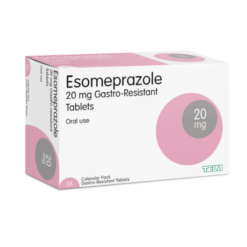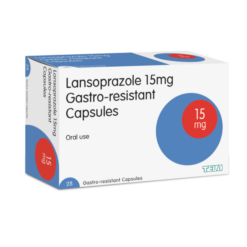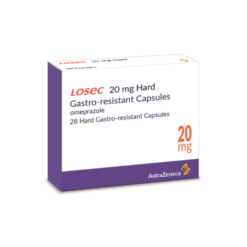-
NHS
-
Oldham Services
-
Shop
-
Help & Advice
A burning sensation in your chest or throat after eating is often a telltale sign of acid reflux. If you suffer with this feeling regularly, then understanding what causes acid reflux is the first step in finding relief and stopping future episodes in their tracks.
There are various things that can trigger acid reflux, from the foods you eat to the stress you feel, and even the pills you might be taking. At Click2Pharmacy, we understand how disruptive acid reflux can be to your daily life. Knowing what causes acid reflux is important for developing strategies to prevent it.
Acid reflux is medically known as gastro-oesophageal reflux disease, or GERD for short. The primary symptom is heartburn, a discomfort or pain that usually starts in the middle of your chest and might move up to your throat. You might also experience a sour taste in the back of your mouth. Other symptoms to watch for include trouble swallowing, feeling a lump in your throat, or a persistent cough.
Acid reflux occurs when stomach acid flows back into the tube that connects your mouth to your stomach, known as the oesophagus. The oesophagus is connected to a ring-like muscle called the lower oesophageal sphincter (LES), which acts as a valve, opening to let food in and closing to keep stomach contents from flowing back up.
If the LES doesn’t close properly or opens too often, stomach acid can escape into the oesophagus. This acidic backwash can irritate the lining of your oesophagus, leading to the burning sensation often associated with acid reflux.
It’s easy to confuse acid reflux with heartburn, but they’re not the same thing. Heartburn is a symptom of acid reflux, which is the burning sensation people often experience with acid reflux. However, you can have acid reflux without heartburn. Some people experience what’s known as ‘silent reflux,’ where the typical symptoms are less obvious but can still cause damage to the oesophagus over time.
Finding what causes acid reflux in your day-to-day life is one of the most effective ways to treat it. While it can take some trial and error to accurately pinpoint which of the following triggers might be causing it, once you have, you can eliminate them from your diet or lifestyle which should reduce or eliminate acid reflux episodes. Here are the most common acid reflux triggers:
Acidic foods are a common cause of acid reflux. Foods like tomatoes, citrus fruits, and even some berries can cause your stomach to produce more acid, leading to reflux. Here are some commonly eaten acidic foods to watch out for:
Spicy foods like hot peppers and curries can irritate your oesophagus and relax the lower oesophageal sphincter, making it easier for stomach acid to flow back up. Fatty foods like fried chicken or burgers can have a similar effect. Here are some spicy and fatty foods to be cautious with if you’re prone to acid reflux:
Your morning cuppa or afternoon coffee might be doing more harm than good when it comes to acid reflux. Both tea and coffee are acidic and can stimulate excess stomach acid production and trigger heartburn. Drinks to be mindful of include:
Both smoking and drinking alcohol can interfere with how your lower oesophageal sphincter functions. They can relax this muscle, making it easier for stomach acid to escape into your oesophagus. If you’re a smoker or enjoy alcoholic drinks, cutting back or quitting could help you experience fewer acid reflux symptoms and episodes.
Pregnant women often find they suffer from acid reflux at various stages of their pregnancy. For most women, once they give birth, acid reflux symptoms ease as there’s less pressure on the oesophagus and your digestive system returns to normal.
Your weight can have a direct impact on the frequency and severity of acid reflux episodes. Carrying extra weight, especially around your abdomen, pushes on your stomach, forcing acid back up into your oesophagus more easily. Many people find that losing even a small amount of weight can lead to big improvements in their symptoms.
Not getting enough physical activity can also contribute to acid reflux. Regular exercise helps your overall digestion and can aid in keeping your weight in check. However, it’s worth noting that intense exercise right after eating can actually trigger acid reflux, so be mindful of waiting 1-2 hours after eating before exercising to avoid this.
Some prescription medications, such as certain types of antidepressants and blood pressure medication, can interfere with normal digestive function, leading to acid reflux. If you suspect your medication is causing your symptoms, you should consult your GP or pharmacist for alternatives. Over-the-counter pain relief like ibuprofen can also be culprits.
Your mental state can have a surprising impact on your digestive system, including triggering acid reflux. When you’re stressed, your body goes into “fight or flight” mode, which can lead to a series of digestive issues, including acid reflux. Stress can cause your stomach to produce more acid, making symptoms worse.
If you experience severe symptoms, have trouble swallowing, and you’ve tried lifestyle changes but still suffer from frequent acid reflux, it’s time to consult a GP or pharmacist. They will likely ask about your symptoms, diet, and lifestyle before advising on the best prescription treatments to ease chronic acid reflux symptoms.
Proton pump inhibitors (PPIs) are commonly prescribed acid reflux medications for this acid reflux, with the most popular ones being:
Esomeprazole, also sold under the brand name Nexium, is a medication that reduces stomach acid production. It’s commonly used to treat conditions like acid reflux and stomach ulcers and works by blocking a specific enzyme in the stomach wall, reducing acid production.
Lansoprazole is another PPI that’s effective in reducing stomach acid, available in a generic form and in Zoton Fastabs. Like Esomeprazole, it works by inhibiting an enzyme in the stomach wall. It’s available over-the-counter in lower doses, but most acid reflux sufferers find they need a prescription strength to effectively treat their symptoms.
Omeprazole, commonly known under the brand name Losec, is one of the most widely used PPIs. It’s effective for both short-term and long-term treatment of acid reflux. Omeprazole works in a similar way to other PPIs by blocking the enzyme responsible for stomach acid production.
The most commonly used over-the-counter medications for acid reflux are antacids, such as Gaviscon. You can also buy a lower dose of esomeprazole over-the-counter, known as Nexium Control.
Some people find relief through natural remedies like herbal teas, apple cider vinegar, or aloe vera juice. However, it’s important to consult your GP or pharmacist before trying these, especially if you’re already on medication for acid reflux.
Understanding what causes acid reflux is the first step toward finding relief, but it’s often not enough for most people who suffer from it. At Click2Pharmacy, our regulated online pharmacy has a dedicated acid reflux clinic and our UK-based pharmacists can help you find the right treatment today. All you need to do is complete an online assessment to get started!




